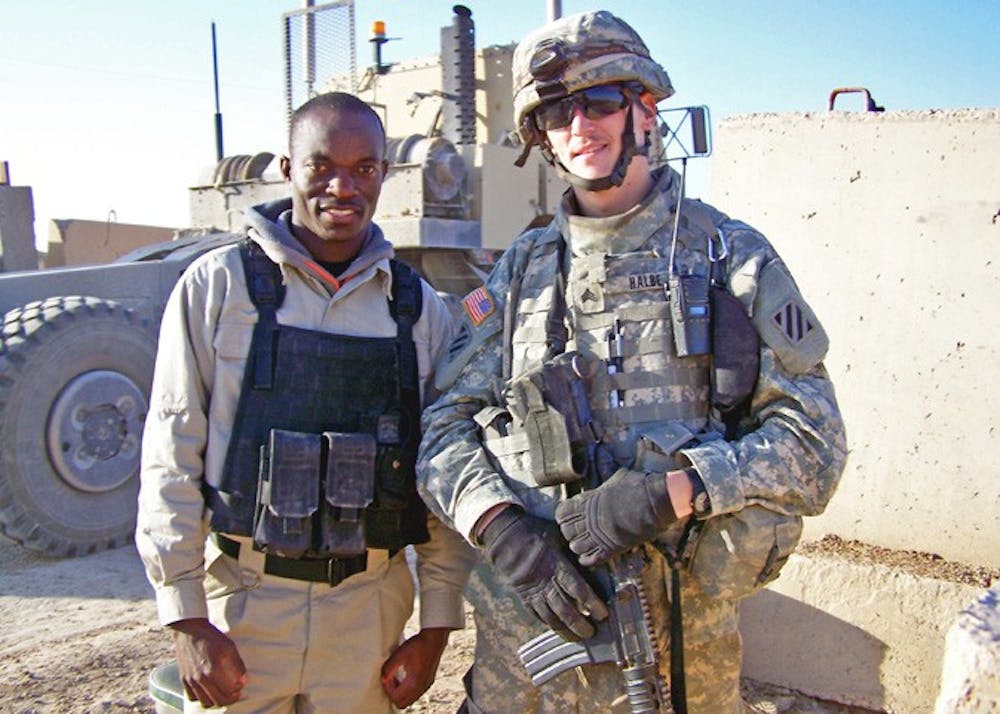Matthew Halbe, a veteran of the Iraq War, woke up last Friday with no intention of going to jail. By that night he found himself in a concrete cell hoping that he wouldn’t have to spend the night.
“The bed was like an elevated concrete platform,” he said.
Arrested for crossing a police line at the “Funk the War: Bad Romance Street Party,” Halbe entered a starkly different environment upon release.
“My girlfriend and a couple of the other protesters were there to greet me when I got out,” he said. “It was really nice. One second I’m in a cold concrete cell, and the next I’m with cheering fans.”
Halbe, a junior in the School of International Service, joined the army in October of his senior year of high school because he wanted the discipline he thought the Army could give him.
“Another reason was a more romantic ideal,” Halbe said. “My grandfather served in the military, and I wanted experience that was associated with that. I wanted that pride, and I wanted to make him proud of me.”
While in Iraq, he worked in signal intelligence, where he analyzed and produced intelligence reports relating to capturing insurgents or forming an understanding of their operations. It was then that he started becoming disillusioned with the process, he said.
“There’s almost a hunger to produce the intelligence, and it doesn’t necessarily have to be good intelligence,” Halbe said. “The decision to go into a town and capture insurgents usually has more to do with the political situation or [is] as a reaction to something bad that’s happened more than [it is] based on information we collect.”
At the end of his first deployment, Halbe wrote in his journal that the United States, though imperfect, was doing good things and trying to make a difference. When he got back home though, he learned that through stop-loss the Army would be redeploying him the following year. Stop-loss is a part of the enlistment contract that allows the military to extend a soldier’s active duty service involuntarily.
“On my second deployment, I was completely useless as far as my job title,” Halbe said. “I ended up just doing guard duty for an entire year, so I had a lot of time to just sit in the guard tower and think. I drafted my application for AU in [that] guard tower.”
Some of Halbe’s shifts in the guard tower lasted as long as 12 hours, giving him time to read, follow the 2008 elections and realize how he felt about the war.
“I think the most conviction I feel about any one issue is about the contracting and moneymaking that happens in Iraq and the waste,” Halbe said. “It doesn’t have as much to do with the ideological questions about why we’re there and why we’re not there. It has more to do with how we go about it.”
Even though he talks about the bad parts of the military, Halbe said he does not want people to overlook the great parts.
Halbe attended the protest out of curiosity and to support his friends, despite being uncomfortable with some of the message. He had no intention of getting arrested beforehand.
When he got arrested, he was standing on the sidewalk 20 feet from the U.S. Treasury building, lingering behind the protest, Halbe said. Two other protestors had just been arrested after climbing onto the second story ledge of the building with a banner that read, “End the Wars/Fund our Future.”
“A cop comes up to me and he says, ‘You have two choices,’” Halbe said. “’You can either go back towards the protest or you can get off the sidewalk.’ I kind of stood there and looked at him, and he said, ‘You can either do what I say or you can get arrested.’ And I said ‘I’ll get arrested.’”
Getting caught up in the environment of the protest, Halbe felt empowered from dancing in the streets when he made his decision.
“You see 200 cops, and you see probably a smaller number of protesters, and you feel this conflict, like it’s us versus them,” he said in a previous interview.
Halbe’s court date is set for April 7. Unless he gets a lawyer for free, he plans to go without representation and accept the penalty he is given, he said.
While Halbe may not agree with everything the United States is doing, he harbors a deep pride for this country.
“I don’t hate America — in fact, I love America,” Halbe said. “I have a lot of pride for my country. I think that it’s important that all students have that whether they disagree with policy [or] what our country does. I think it’s important to have a love for the people of our country and love our own personal histories.”
You can reach this writer at news@theeagleonline.com.





